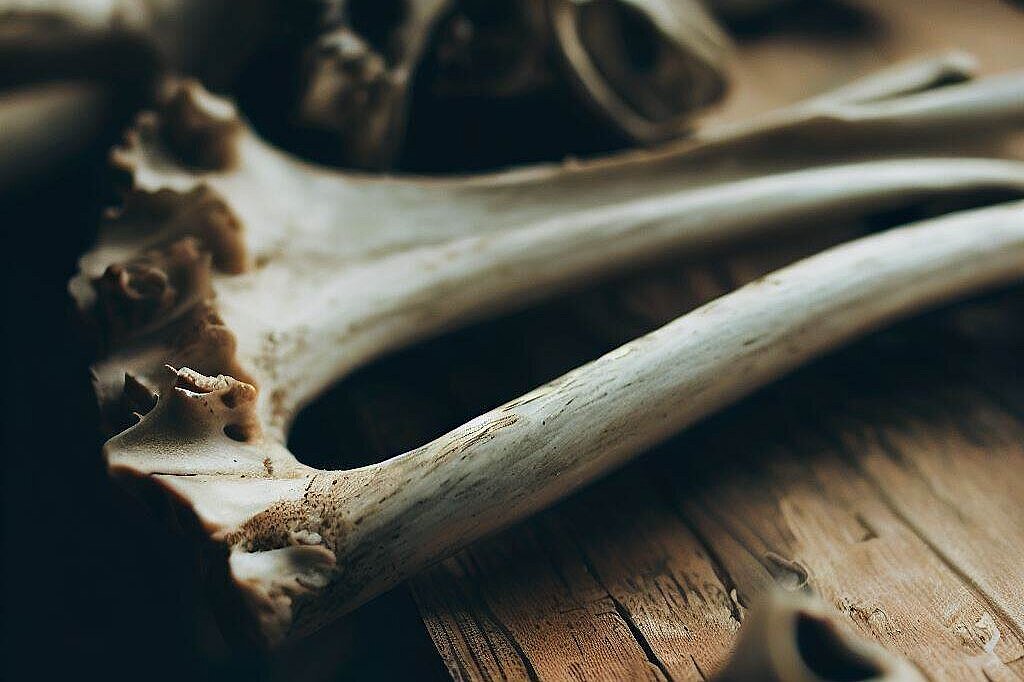Duck bone

Duck bones are an often debated topic in the world of pet nutrition. While some extol the benefits of raw bones for their dogs' dental health and nutrition, others warn of the potential dangers they can bring. In this article, we dive deeper into the topic of duck bones for dogs, examining what they are and weighing up the pros and cons to help you make an informed decision about their suitability as part of your dog's diet.
What are duck bones?
Duck bones, as the name suggests, come from ducks. They can be fed in various forms, including raw as part of a BARF (Biologically Appropriate Raw Food) diet or cooked in home-cooked meals. While raw bones are often praised for their nutritional benefits and ability to aid chewing behavior, they also carry risks that need to be considered.
Benefits of duck bones for dogs
Dental health
Chewing on raw bones can help reduce plaque and tartar, which in turn reduces the risk of dental problems. The abrasive action of the bones on the teeth helps to keep the teeth clean and massage the gums.
Nutrient content
Duck bones are a source of calcium and phosphorus, two minerals that are essential for bone and dental health. They also contain bone marrow, which provides fats, iron, vitamin A and other micronutrients that can contribute to a dog's overall health.
Behavioral benefits
Chewing is a natural behavior for dogs and can contribute to mental stimulation. Chewing on bones can prevent boredom and serve as a healthy way to relieve stress.
Disadvantages and risks of duck bones for dogs
Risk of broken bones
Chewing on hard bones can lead to broken or damaged teeth, especially in dogs with a strong bite or older dogs with weaker teeth.
Internal blockage risk
Swallowed pieces of bone can get stuck in the digestive tract and lead to a blockage which, in the worst case, may require surgical removal.
Risk of injury
Sharp bone splinters, especially from cooked bones, can injure the mouth, tongue or digestive tract. Cooked bones should never be fed due to the increased risk of splinters.
Nutritional imbalances
Excessive feeding of bones can lead to an imbalance in nutrient intake, particularly an excessive calcium-phosphorus ratio, which can lead to other nutritional problems.
Duck bones can be a nutritious addition to your dog's diet under certain conditions, especially when fed raw and as part of a balanced diet. However, it is crucial to consider the potential risks and take steps to minimize the risk of injury or health problems. This includes feeding the bones under supervision, considering your dog's size and chewing behavior, and refraining from feeding cooked bones.
If you notice any signs of hypersensitivity or poisoning in your dog, you should see your vet immediately. We are not a substitute for a vet, but we try to be as accurate as possible. Every dog reacts differently and we recommend you get a second opinion or consult your vet if in doubt.
Stay healthy and take good care of your four-legged friend!😊
Similar to Duck bone
Chicken bones are bones from chickens, which are usually a waste product from meat processing. They consist of collagen, a protein that gives bones stability, and minerals such as calcium and...
Pigeon bones are, as the name suggests, the bones of pigeons. They tend to be smaller and more tender than the bones of many other meat sources used in dog food. These characteristics could make...
Quail bones, as the name suggests, come from quails - small birds known for their tender meat. Unlike the bones of larger animals, quail bones are finer, smaller and softer. This makes them a...
Goat bones are a product from the slaughter of goats. These are the bones and cartilage that are not suitable for human consumption. These are dried, crushed and processed into a powder or...


